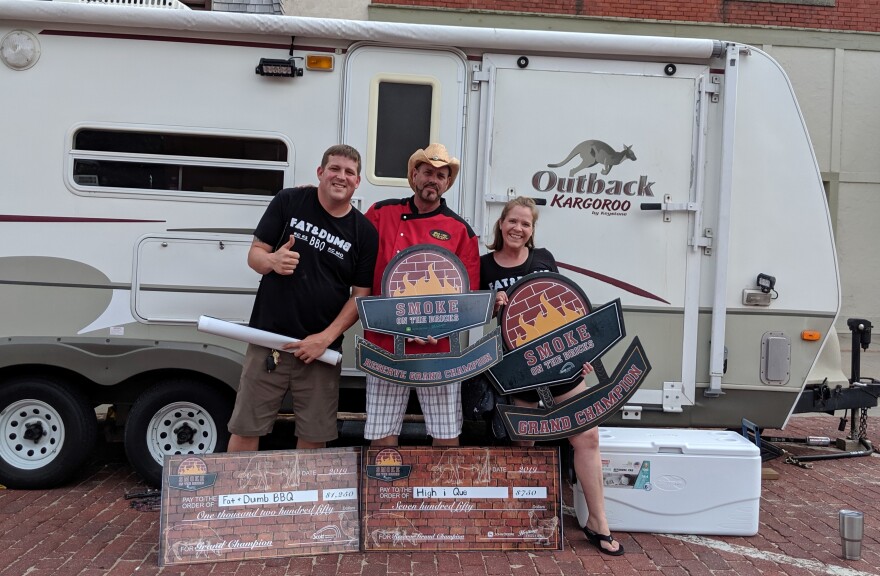Barbecue restaurants are nothing without their meat. But meatpacking plant closures across the country are disrupting the supply chain, creating tough decisions for chefs and enthusiasts alike.
Popular cuts of meat are in short supply and, in some cases, triple the regular market price — but restaurants don’t want to pass the difference onto their customers.
Less popular cuts and types of meat are still available, but using them would mean drastically altering menus and perhaps failing to meet customers' expectations.
“It may not be exactly what they would traditionally want, but we’re keeping the food supply rolling,” Paul Mies says. “You may go into a restaurant and think you want a beef sandwich, but you’re perfectly satisfied with a turkey sandwich.”
Mies is one of the owners of Mies Family Foods, a retail and restaurant food distributor in North Kansas City. He buys meat from major suppliers like Tyson, National Beef and JBS Swift, as well as regional packers like Greater Omaha, Western Reserve and Creek Stone out of Wichita.

As of the first week of May, at least twenty meatpacking facilities across the country had temporarily closed — a disruption that amounts to a 35% decrease in beef and pork production from this time last year.
Mies services roughly 75 Kansas City barbecue restaurants when they’re all open, including Zarda BBQ’s two locations and Jack Stack BBQ's production facility for catering and mail order in Alma, Missouri.
He says that with the closure of plants, he’s seen the price of a brisket — a go-to for most barbecue places — rise from $2.75 per pound to $6.00. So, he’ll wait for the price to drop before he buys.
He can, however, offer buyers another cut, like a frozen brisket point, or even another type of meat altogether. In fact, he has 120 thousand pounds of brisket point on hand.
“Honestly, it’s creativity on their part on what to promote and how promote it, to get people to choose something other than what they originally may think they want,” Mies says.
Gates Barbecue Chief Operating Officer George Gates reports that his supply is fine, and he’s not faced any tough decisions just yet.
“I’ve been having no problems right now. My purveyors haven’t brought me any hikes,” Gates says.

He notes that he “books” his meat months or even a full year in advance. He pays for what he wants and his supplier delivers to him on a regular basis, and he doesn’t see that changing any time soon.
But that’s the experience of one of Kansas City’s barbecue granddaddies with six locations.
Blind Box BBQ in Shawnee tells a different story. Owner Joe Tulipana faces a lot of legwork every time he wants to restock.
Tulipana’s distributors can no longer reliably deliver his normal order, so he makes multiple phone calls to find the inventory he wants at the price he hopes to pay.
“If we can get chicken, we’ve seen the price almost double for items like chicken wings, chicken breasts, bone-in chicken, everything,” Tulipana says. “Same thing with pork.”
In spite of these difficulties, Blind Box has not raised its prices or altered its menu so far.
Lou Fantasma, Plant Manager of Paradise Locker Meats in Trimble, Missouri, says the flux makes sense, and in general people shouldn’t worry.
Paradise is a family owned meat processing and retail outlet that, under normal circumstances, supplies meat to around 25 Kansas City restaurants, including some of the smaller barbecue places that he declined to name.
“The problem is, we’re having a hard time right now converting live animals to meat products,” Fantasma explains.
Paradise, like Mies Family Foods, is shoring up retail supplies, though they say that’s not taking from what they’re able to send to restaurants. Their retail sides are doing brisk business as people are cooking and barbecuing at home much more than usual.
Mike Peterson of Kansas City, Kansas, is neither a typical home cook nor a restaurateur, but something in between.
As a competitive griller, Peterson’s challenge is nearly the opposite of a typical shopper, asked to limit meat purchases at grocery store chains, and opposite of restaurant owners like Tulipana struggling to find desirable inventory.

Instead, Peterson, who’s one half of the award-winning Fat & Dumb BBQ team, is sitting on hundreds of pounds of now-frozen meat he bought for upcoming contests.
In preparation for the FireLake BBQ Cook Off in Shawnee, Oklahoma, originally set for March 20, he’d purchased ten pork shoulders, five beef briskets, and 20 racks of ribs.
Then the competition, as well as every other event for the barbecue season which normally extends from March through October, was either postponed or cancelled.

“The toughest thing was just the anticipation of getting back on the trail and picking up where we left off last year, which was incredibly positive,” Peterson says. “We were very excited to get back out, and then all of a sudden, here we are: nothing.”
So, while his personal supply is in excellent shape, he has no outlet for using it other than to wine and dine his only shelter-in-place companion, his wife. He’s hopeful that some of the postponed competitions will soon announce new dates.
Paul Mies is hopeful as well. He says he thinks the meat industry will be back in full swing and operating as usual by mid-June.
And until then, he says, “We need to just limp along and keep it going.”


